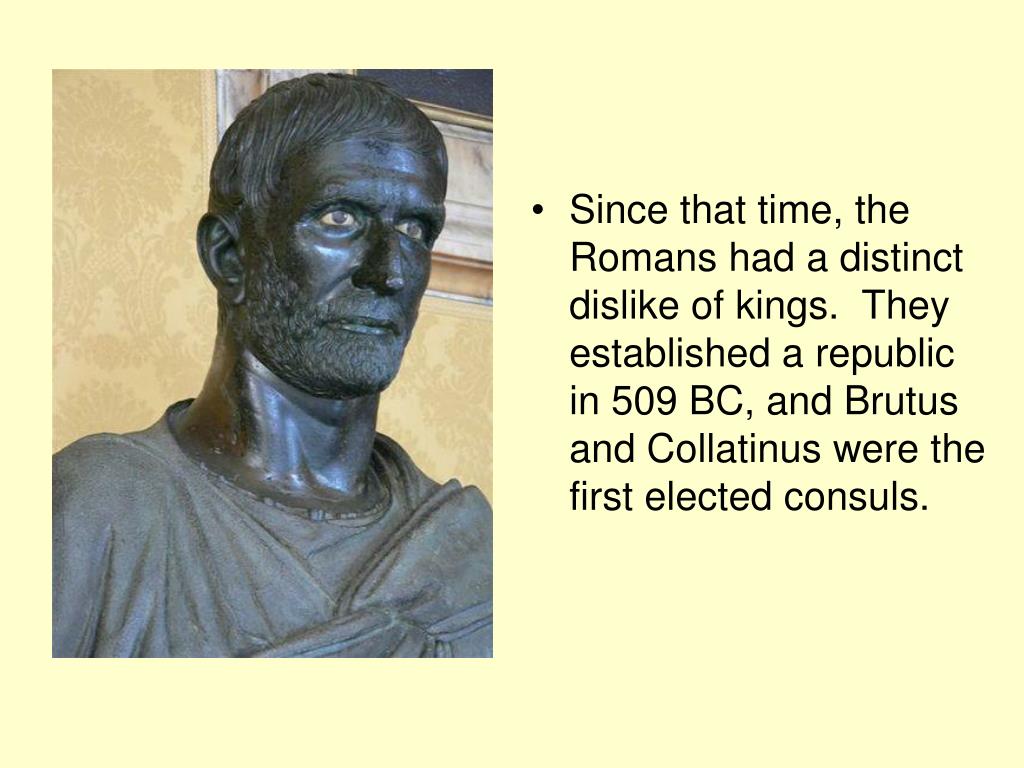

Marcus Brutus, Roman general, one of the conspirators in Shakespeare’s Julius Caesar. The two men had led the revolution which overthrew the Roman monarchy. Why did the Romans overthrow Tarquinius Superbus?Ĭollatinus was one of the first two consuls of the Roman Republic in 509 BC, together with Lucius Junius Brutus.Who are Brutus and Collatinus who is tarquinius?.The background of Brutus's speech-and, at the same time, the pretext for the expulsion of the Tarquins-was the violation. Brutus reflects, on the one hand, the senatorial tradition about his ideology and lineage, and, on the other, Augustus' contemporary self-representation as the restorer of Republican values.

Junius Brutus and the speech he delivers to the Roman patricians before the deposition of King L. Following this idea, I will discuss the account that Dionysius provides for the foundation of the Republic, examining in particular the figure of L. (4) However, far from being a mere collage of his sources' opinions, the interpretation that Dionysius provides for many episodes is clearly his own, and could plausibly depend on his own understanding of contemporary issues that he experienced firsthand during his long stay at Rome and his assimilation of these into his own conception of the Romans. In his narrative, Dionysius often claims to follow accurately the accounts of his sources, which are mainly (but not exclusively) Roman annalistic writers. The declared purpose of Dionysius' history was to instruct his Greek readers about the distant past of the Romans in order to explain the reasons for the Romans' success by showing their persistent moral superiority, and ultimately to help his readers to hail their conquerors (D. (2) However, in his Roman Antiquities, Dionysius seldom refers to his own times, and while it has been possible to trace his literary inclinations-especially through his rhetorical treatises-his political thought remains largely conjectural. (1) Textual evidence suggests that Dionysius frequented the aristocratic circles of the city, perhaps as a private teacher, and was an aristocrat himself back home. Information about Dionysius' life is scanty: as he himself writes in the preface of his work, he arrived at Rome around 30 BC, at the end of the civil wars, and lived there for over twenty years. Toward the end of the first century BC, Dionysius of Halicarnassus composed a history of Rome from its legendary origins down to the First Punic War. Key words: historiography, tyranny, monarchy, patricians, legitimacy, constitution, propaganda, restoration, lineage, pietas This account may thus be regarded as Dionysius' own elaboration of Augustus's constitutional reform. Brutus and the tyrannicide Ahala-and, at the same time, the character of Augustus's newly-founded government. Junius Brutus-Caesar's murderer, who claimed descent from L. Throughout this paper, I show how Dionysius in his presentation of Brutus picked up elements both related to the senatorial propaganda against M. The new constitution, although remaining essentially monarchical, will keep its autocratic nature concealed from the people. In my paper I analyze the speech that Brutus delivers to the Roman patricians to endorse the establishment of a new government in Rome. Summary: Contrarily to most traditional accounts on the foundation of the Republic, Dionysius describes the passage from the Tarquins' monarchy to the Republic as a lawful constitutional reform, in which L.


 0 kommentar(er)
0 kommentar(er)
